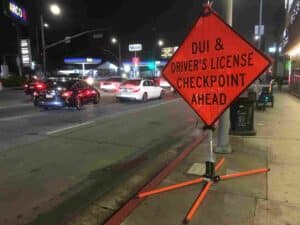
Arrests for driving under the influence (DUI) in Pennsylvania often begin as a result of a traffic stop. In many cases, police officers pull drivers over after noticing that they are suspiciously operating their vehicles. In some cases, other traffic violations, such as running red lights or speeding, can prompt a DUI investigation. So long as an officer has a valid reason to pull a suspect over, it is not highly controversial. However, there are instances where police officers initiate DUI checkpoints and stop vehicles randomly to check for impairment without any particular suspicion.
Although DUI checkpoints are generally legal in Pennsylvania, there are strict legal requirements that must be followed. Our DUI defense lawyer in Philadelphia will explain your rights and what you can do if you are arrested for DUI after being stopped at a checkpoint.
Constitutional Rights
The Fourth Amendment of the United States Constitution protects citizens against unreasonable searches and seizures. Law enforcement must adhere to certain guidelines at DUI checkpoints to respect these constitutional rights.
Probable Cause
Law enforcement officers must have a valid reason, known as probable cause, to stop and search a vehicle. The stop is generally considered legal at DUI checkpoints so long as it is part of a predetermined and systematic screening process.
Brief Detention
The duration of the stop at a DUI checkpoint should be brief and focused on determining whether the driver is impaired. Extended detentions without reasonable suspicion of impairment may violate your Fourth Amendment rights.
Your Responsibilities at DUI Checkpoints in Philadelphia
While you have rights, it’s also important to understand your responsibilities when approaching a DUI checkpoint.
Compliance with Authorities
Follow the instructions of law enforcement officers at the checkpoint. This includes stopping when directed, providing your driver’s license and registration, and answering basic questions about your identity.
Field Sobriety Tests
In Pennsylvania, you are not required to submit to field sobriety tests at a DUI checkpoint. These tests, such as walking in a straight line or standing on one leg, are voluntary. Politely declining these tests does not imply guilt.
Breath Tests
While you can refuse a preliminary breath test (PBT) at the scene, refusing a chemical test at the police station can result in consequences such as license suspension under Pennsylvania’s implied consent laws.
Your Rights at a DUI Checkpoint
You have several rights while at DUI checkpoints.
The Right to Remain Silent
While at a DUI checkpoint in Philadelphia, it is vital to remember that you have a right to remain silent. You are never obligated to answer questions about your activities or whether you have consumed alcohol. You do not have to tell the officer where you are coming from or where you are going. Politely asserting your right to remain silent can help protect your interests.
The Right to Refuse Search
You have the right to refuse a search of your vehicle. Law enforcement needs probable cause or your consent to conduct a search. Politely and firmly asserting your right to refuse searches can protect your privacy.
The Right to Avoid Self-Incrimination
Exercise caution when answering questions. While you must provide identification and vehicle registration, you are not required to provide potentially self-incriminating information. Be mindful of your responses.
Finally, you have a right to record interactions with law enforcement so long as you are not interfering with their duties. You should record this interaction. Should you be charged with DUI, our Philadelphia DUI lawyer will be able to use this critical evidence in support of your claim.
Consequences of Not Complying with Police
While you have various rights at DUI checkpoints in Philadelphia, you must also comply. You can face some consequences if you do not cooperate with law enforcement.
Increased Suspicion
Non-compliance may raise suspicion among law enforcement officers. While asserting your rights, it is crucial to do so in a calm and respectful manner to avoid escalating the situation.
Arrest and Detention
Refusing a chemical test at the police station may lead to arrest and detention. Understanding the implied consent laws in Pennsylvania is essential to make informed decisions.
If you are detained at a DUI checkpoint in Philadelphia, you must contact our Philadelphia DUI lawyer immediately.
Call Our DUI Defense Lawyer in Philadelphia Today
Having a skilled and experienced Philadelphia DUI lawyer by your side is crucial when facing DUI charges in Philadelphia. A. Charles Peruto Jr. has the experience, knowledge of local laws, and track record of success to provide you with top-tier DUI defense.
With over 44 years of experience and a commitment to personalized representation, our DUI defense lawyer in Philadelphia is dedicated to protecting your rights and achieving the best possible outcome for your case.
Do not let a DUI charge jeopardize your future. Contact The Law Offices of A. Charles Peruto Jr., today for a free and confidential consultation so we can begin building a strong defense on your behalf.










